An Analysis of Laws, Ethics, and CSR Reporting: The Giordano Example
VerifiedAdded on 2020/06/04
|37
|10809
|127
Dissertation
AI Summary
This dissertation investigates the impact of laws and ethics on accounting and Corporate Social Responsibility (CSR) reporting, focusing on Giordano, a prominent retail brand in Hong Kong. The study explores the relationship between legal frameworks, ethical considerations, and sustainability reporting practices. The research aims to assess the positive and negative influences of laws and ethics on accounting and CSR reporting, identify relevant laws and ethical aspects, and evaluate their impact on Giordano's sustainability reporting. The methodology includes a literature review examining the relationship between law and ethics, the history of sustainability reporting in Hong Kong, and guidelines for reporting. The research employs a thematic analysis of collected data to present findings and recommendations for companies to comply with regulatory aspects. The dissertation highlights the importance of standards in accounting for stakeholders' decision-making and the increasing emphasis on CSR activities. The findings provide insights for researchers and companies, offering guidance on the influence of laws and ethics on accounting and sustainability reporting.
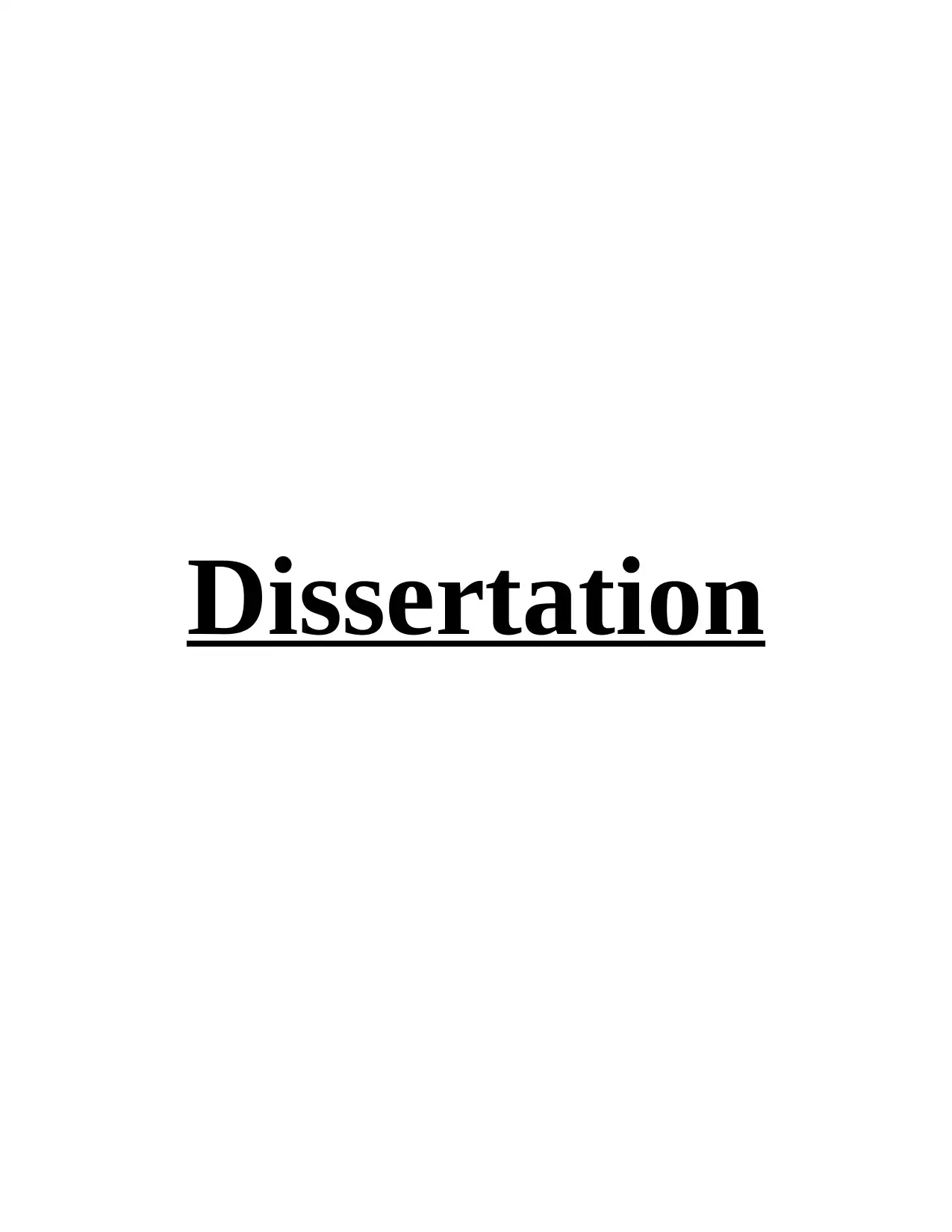
Dissertation
Paraphrase This Document
Need a fresh take? Get an instant paraphrase of this document with our AI Paraphraser
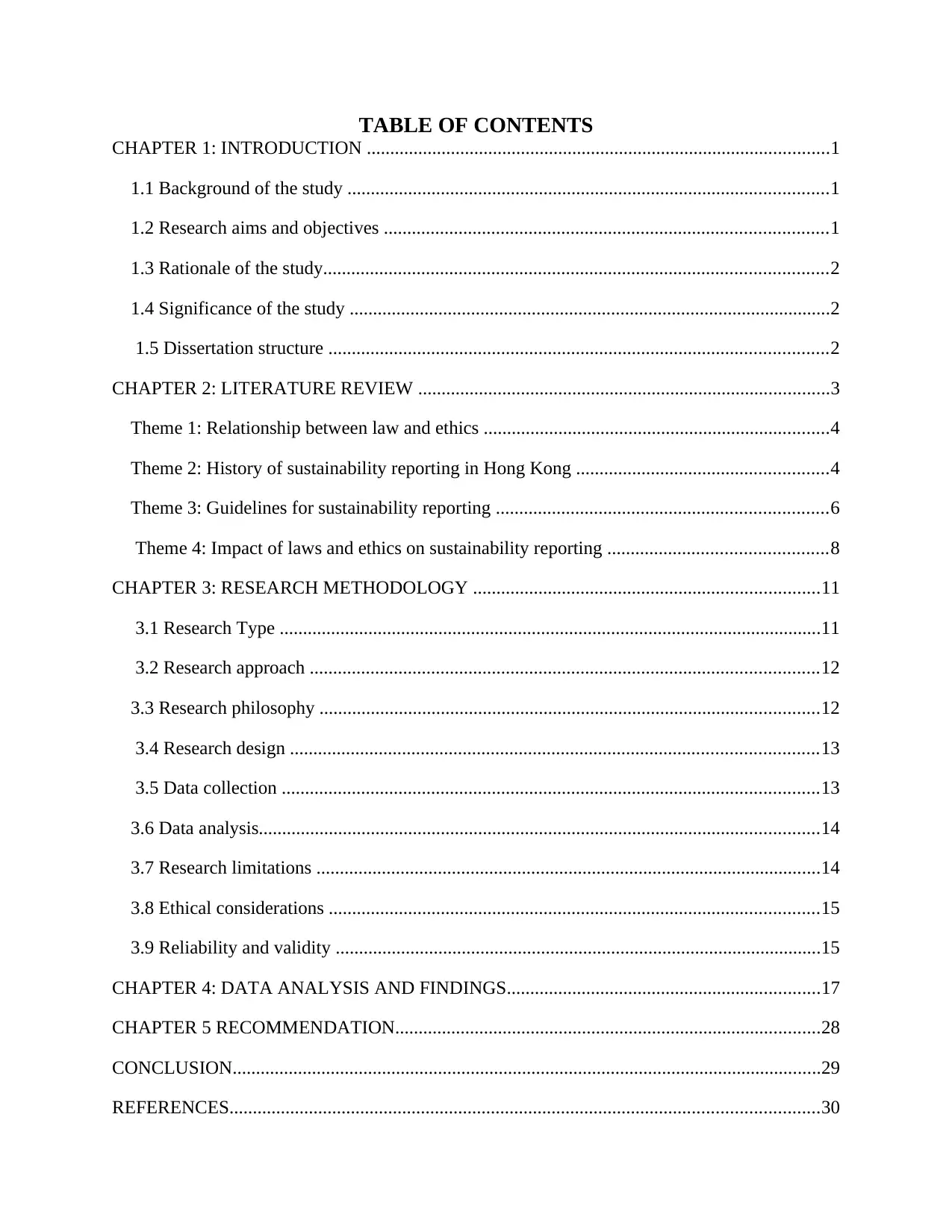
TABLE OF CONTENTS
CHAPTER 1: INTRODUCTION ...................................................................................................1
1.1 Background of the study .......................................................................................................1
1.2 Research aims and objectives ...............................................................................................1
1.3 Rationale of the study............................................................................................................2
1.4 Significance of the study .......................................................................................................2
1.5 Dissertation structure ...........................................................................................................2
CHAPTER 2: LITERATURE REVIEW ........................................................................................3
Theme 1: Relationship between law and ethics ..........................................................................4
Theme 2: History of sustainability reporting in Hong Kong ......................................................4
Theme 3: Guidelines for sustainability reporting .......................................................................6
Theme 4: Impact of laws and ethics on sustainability reporting ...............................................8
CHAPTER 3: RESEARCH METHODOLOGY ..........................................................................11
3.1 Research Type ....................................................................................................................11
3.2 Research approach .............................................................................................................12
3.3 Research philosophy ...........................................................................................................12
3.4 Research design .................................................................................................................13
3.5 Data collection ...................................................................................................................13
3.6 Data analysis........................................................................................................................14
3.7 Research limitations ............................................................................................................14
3.8 Ethical considerations .........................................................................................................15
3.9 Reliability and validity ........................................................................................................15
CHAPTER 4: DATA ANALYSIS AND FINDINGS...................................................................17
CHAPTER 5 RECOMMENDATION...........................................................................................28
CONCLUSION..............................................................................................................................29
REFERENCES..............................................................................................................................30
CHAPTER 1: INTRODUCTION ...................................................................................................1
1.1 Background of the study .......................................................................................................1
1.2 Research aims and objectives ...............................................................................................1
1.3 Rationale of the study............................................................................................................2
1.4 Significance of the study .......................................................................................................2
1.5 Dissertation structure ...........................................................................................................2
CHAPTER 2: LITERATURE REVIEW ........................................................................................3
Theme 1: Relationship between law and ethics ..........................................................................4
Theme 2: History of sustainability reporting in Hong Kong ......................................................4
Theme 3: Guidelines for sustainability reporting .......................................................................6
Theme 4: Impact of laws and ethics on sustainability reporting ...............................................8
CHAPTER 3: RESEARCH METHODOLOGY ..........................................................................11
3.1 Research Type ....................................................................................................................11
3.2 Research approach .............................................................................................................12
3.3 Research philosophy ...........................................................................................................12
3.4 Research design .................................................................................................................13
3.5 Data collection ...................................................................................................................13
3.6 Data analysis........................................................................................................................14
3.7 Research limitations ............................................................................................................14
3.8 Ethical considerations .........................................................................................................15
3.9 Reliability and validity ........................................................................................................15
CHAPTER 4: DATA ANALYSIS AND FINDINGS...................................................................17
CHAPTER 5 RECOMMENDATION...........................................................................................28
CONCLUSION..............................................................................................................................29
REFERENCES..............................................................................................................................30

APPENDIX....................................................................................................................................33
⊘ This is a preview!⊘
Do you want full access?
Subscribe today to unlock all pages.

Trusted by 1+ million students worldwide
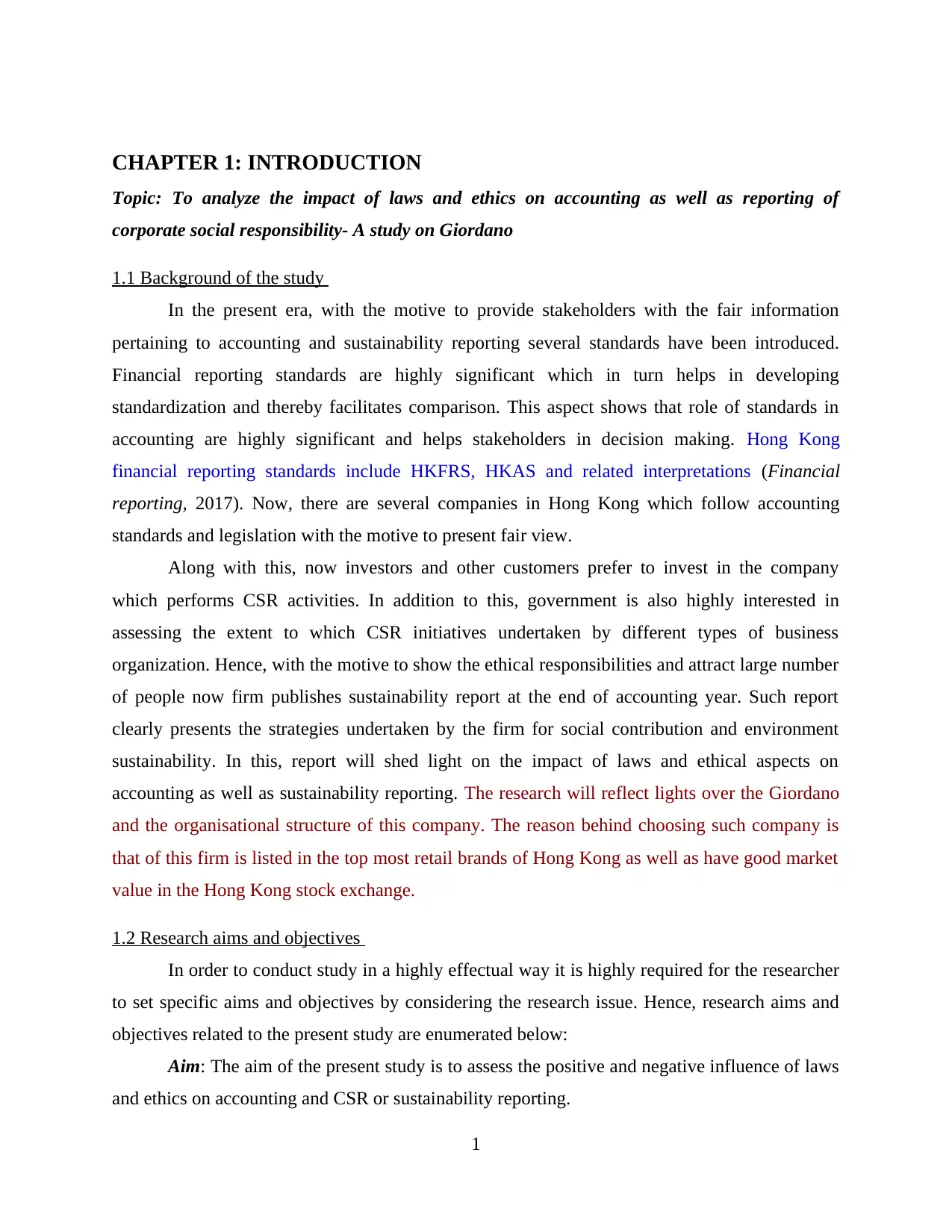
CHAPTER 1: INTRODUCTION
Topic: To analyze the impact of laws and ethics on accounting as well as reporting of
corporate social responsibility- A study on Giordano
1.1 Background of the study
In the present era, with the motive to provide stakeholders with the fair information
pertaining to accounting and sustainability reporting several standards have been introduced.
Financial reporting standards are highly significant which in turn helps in developing
standardization and thereby facilitates comparison. This aspect shows that role of standards in
accounting are highly significant and helps stakeholders in decision making. Hong Kong
financial reporting standards include HKFRS, HKAS and related interpretations (Financial
reporting, 2017). Now, there are several companies in Hong Kong which follow accounting
standards and legislation with the motive to present fair view.
Along with this, now investors and other customers prefer to invest in the company
which performs CSR activities. In addition to this, government is also highly interested in
assessing the extent to which CSR initiatives undertaken by different types of business
organization. Hence, with the motive to show the ethical responsibilities and attract large number
of people now firm publishes sustainability report at the end of accounting year. Such report
clearly presents the strategies undertaken by the firm for social contribution and environment
sustainability. In this, report will shed light on the impact of laws and ethical aspects on
accounting as well as sustainability reporting. The research will reflect lights over the Giordano
and the organisational structure of this company. The reason behind choosing such company is
that of this firm is listed in the top most retail brands of Hong Kong as well as have good market
value in the Hong Kong stock exchange.
1.2 Research aims and objectives
In order to conduct study in a highly effectual way it is highly required for the researcher
to set specific aims and objectives by considering the research issue. Hence, research aims and
objectives related to the present study are enumerated below:
Aim: The aim of the present study is to assess the positive and negative influence of laws
and ethics on accounting and CSR or sustainability reporting.
1
Topic: To analyze the impact of laws and ethics on accounting as well as reporting of
corporate social responsibility- A study on Giordano
1.1 Background of the study
In the present era, with the motive to provide stakeholders with the fair information
pertaining to accounting and sustainability reporting several standards have been introduced.
Financial reporting standards are highly significant which in turn helps in developing
standardization and thereby facilitates comparison. This aspect shows that role of standards in
accounting are highly significant and helps stakeholders in decision making. Hong Kong
financial reporting standards include HKFRS, HKAS and related interpretations (Financial
reporting, 2017). Now, there are several companies in Hong Kong which follow accounting
standards and legislation with the motive to present fair view.
Along with this, now investors and other customers prefer to invest in the company
which performs CSR activities. In addition to this, government is also highly interested in
assessing the extent to which CSR initiatives undertaken by different types of business
organization. Hence, with the motive to show the ethical responsibilities and attract large number
of people now firm publishes sustainability report at the end of accounting year. Such report
clearly presents the strategies undertaken by the firm for social contribution and environment
sustainability. In this, report will shed light on the impact of laws and ethical aspects on
accounting as well as sustainability reporting. The research will reflect lights over the Giordano
and the organisational structure of this company. The reason behind choosing such company is
that of this firm is listed in the top most retail brands of Hong Kong as well as have good market
value in the Hong Kong stock exchange.
1.2 Research aims and objectives
In order to conduct study in a highly effectual way it is highly required for the researcher
to set specific aims and objectives by considering the research issue. Hence, research aims and
objectives related to the present study are enumerated below:
Aim: The aim of the present study is to assess the positive and negative influence of laws
and ethics on accounting and CSR or sustainability reporting.
1
Paraphrase This Document
Need a fresh take? Get an instant paraphrase of this document with our AI Paraphraser
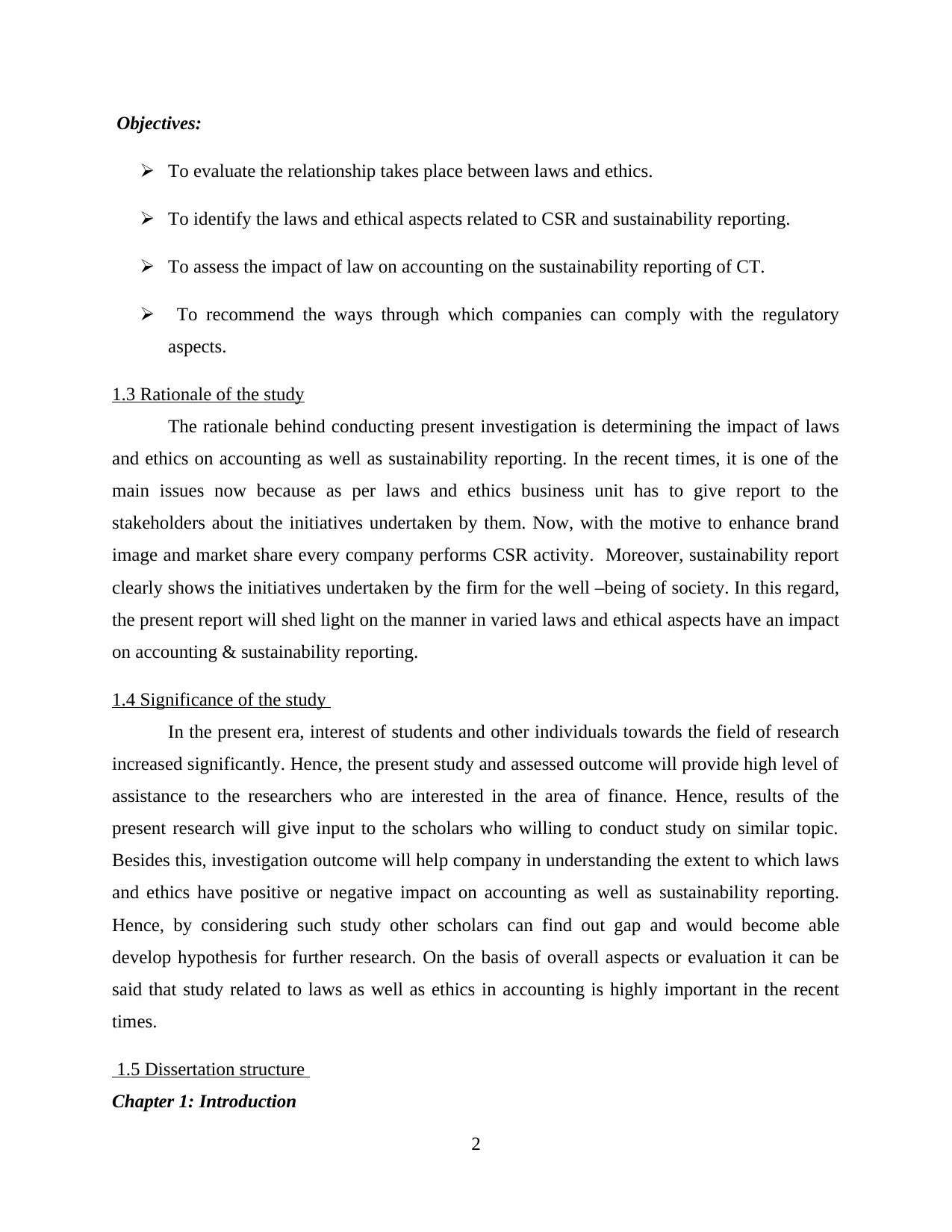
Objectives:
To evaluate the relationship takes place between laws and ethics.
To identify the laws and ethical aspects related to CSR and sustainability reporting.
To assess the impact of law on accounting on the sustainability reporting of CT.
To recommend the ways through which companies can comply with the regulatory
aspects.
1.3 Rationale of the study
The rationale behind conducting present investigation is determining the impact of laws
and ethics on accounting as well as sustainability reporting. In the recent times, it is one of the
main issues now because as per laws and ethics business unit has to give report to the
stakeholders about the initiatives undertaken by them. Now, with the motive to enhance brand
image and market share every company performs CSR activity. Moreover, sustainability report
clearly shows the initiatives undertaken by the firm for the well –being of society. In this regard,
the present report will shed light on the manner in varied laws and ethical aspects have an impact
on accounting & sustainability reporting.
1.4 Significance of the study
In the present era, interest of students and other individuals towards the field of research
increased significantly. Hence, the present study and assessed outcome will provide high level of
assistance to the researchers who are interested in the area of finance. Hence, results of the
present research will give input to the scholars who willing to conduct study on similar topic.
Besides this, investigation outcome will help company in understanding the extent to which laws
and ethics have positive or negative impact on accounting as well as sustainability reporting.
Hence, by considering such study other scholars can find out gap and would become able
develop hypothesis for further research. On the basis of overall aspects or evaluation it can be
said that study related to laws as well as ethics in accounting is highly important in the recent
times.
1.5 Dissertation structure
Chapter 1: Introduction
2
To evaluate the relationship takes place between laws and ethics.
To identify the laws and ethical aspects related to CSR and sustainability reporting.
To assess the impact of law on accounting on the sustainability reporting of CT.
To recommend the ways through which companies can comply with the regulatory
aspects.
1.3 Rationale of the study
The rationale behind conducting present investigation is determining the impact of laws
and ethics on accounting as well as sustainability reporting. In the recent times, it is one of the
main issues now because as per laws and ethics business unit has to give report to the
stakeholders about the initiatives undertaken by them. Now, with the motive to enhance brand
image and market share every company performs CSR activity. Moreover, sustainability report
clearly shows the initiatives undertaken by the firm for the well –being of society. In this regard,
the present report will shed light on the manner in varied laws and ethical aspects have an impact
on accounting & sustainability reporting.
1.4 Significance of the study
In the present era, interest of students and other individuals towards the field of research
increased significantly. Hence, the present study and assessed outcome will provide high level of
assistance to the researchers who are interested in the area of finance. Hence, results of the
present research will give input to the scholars who willing to conduct study on similar topic.
Besides this, investigation outcome will help company in understanding the extent to which laws
and ethics have positive or negative impact on accounting as well as sustainability reporting.
Hence, by considering such study other scholars can find out gap and would become able
develop hypothesis for further research. On the basis of overall aspects or evaluation it can be
said that study related to laws as well as ethics in accounting is highly important in the recent
times.
1.5 Dissertation structure
Chapter 1: Introduction
2
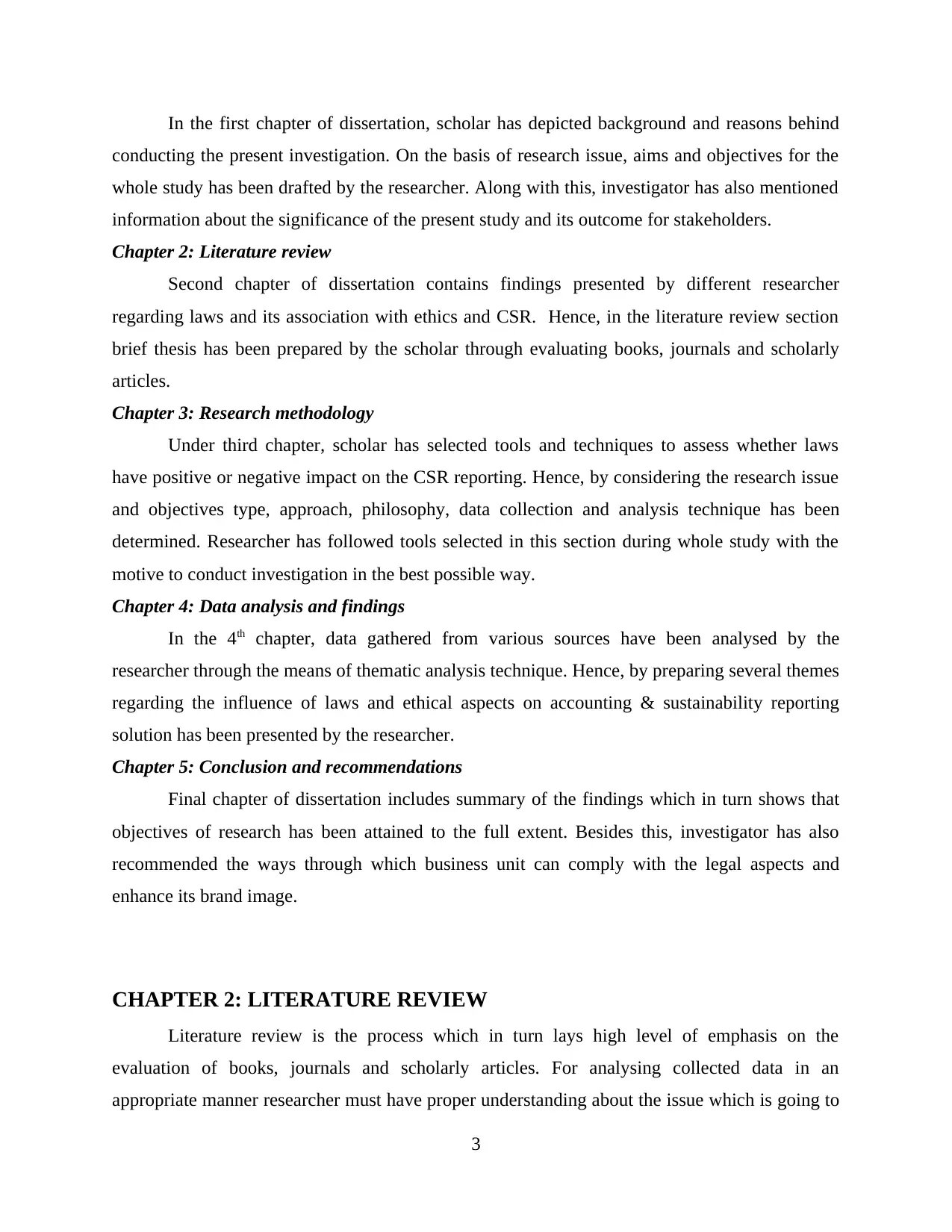
In the first chapter of dissertation, scholar has depicted background and reasons behind
conducting the present investigation. On the basis of research issue, aims and objectives for the
whole study has been drafted by the researcher. Along with this, investigator has also mentioned
information about the significance of the present study and its outcome for stakeholders.
Chapter 2: Literature review
Second chapter of dissertation contains findings presented by different researcher
regarding laws and its association with ethics and CSR. Hence, in the literature review section
brief thesis has been prepared by the scholar through evaluating books, journals and scholarly
articles.
Chapter 3: Research methodology
Under third chapter, scholar has selected tools and techniques to assess whether laws
have positive or negative impact on the CSR reporting. Hence, by considering the research issue
and objectives type, approach, philosophy, data collection and analysis technique has been
determined. Researcher has followed tools selected in this section during whole study with the
motive to conduct investigation in the best possible way.
Chapter 4: Data analysis and findings
In the 4th chapter, data gathered from various sources have been analysed by the
researcher through the means of thematic analysis technique. Hence, by preparing several themes
regarding the influence of laws and ethical aspects on accounting & sustainability reporting
solution has been presented by the researcher.
Chapter 5: Conclusion and recommendations
Final chapter of dissertation includes summary of the findings which in turn shows that
objectives of research has been attained to the full extent. Besides this, investigator has also
recommended the ways through which business unit can comply with the legal aspects and
enhance its brand image.
CHAPTER 2: LITERATURE REVIEW
Literature review is the process which in turn lays high level of emphasis on the
evaluation of books, journals and scholarly articles. For analysing collected data in an
appropriate manner researcher must have proper understanding about the issue which is going to
3
conducting the present investigation. On the basis of research issue, aims and objectives for the
whole study has been drafted by the researcher. Along with this, investigator has also mentioned
information about the significance of the present study and its outcome for stakeholders.
Chapter 2: Literature review
Second chapter of dissertation contains findings presented by different researcher
regarding laws and its association with ethics and CSR. Hence, in the literature review section
brief thesis has been prepared by the scholar through evaluating books, journals and scholarly
articles.
Chapter 3: Research methodology
Under third chapter, scholar has selected tools and techniques to assess whether laws
have positive or negative impact on the CSR reporting. Hence, by considering the research issue
and objectives type, approach, philosophy, data collection and analysis technique has been
determined. Researcher has followed tools selected in this section during whole study with the
motive to conduct investigation in the best possible way.
Chapter 4: Data analysis and findings
In the 4th chapter, data gathered from various sources have been analysed by the
researcher through the means of thematic analysis technique. Hence, by preparing several themes
regarding the influence of laws and ethical aspects on accounting & sustainability reporting
solution has been presented by the researcher.
Chapter 5: Conclusion and recommendations
Final chapter of dissertation includes summary of the findings which in turn shows that
objectives of research has been attained to the full extent. Besides this, investigator has also
recommended the ways through which business unit can comply with the legal aspects and
enhance its brand image.
CHAPTER 2: LITERATURE REVIEW
Literature review is the process which in turn lays high level of emphasis on the
evaluation of books, journals and scholarly articles. For analysing collected data in an
appropriate manner researcher must have proper understanding about the issue which is going to
3
⊘ This is a preview!⊘
Do you want full access?
Subscribe today to unlock all pages.

Trusted by 1+ million students worldwide
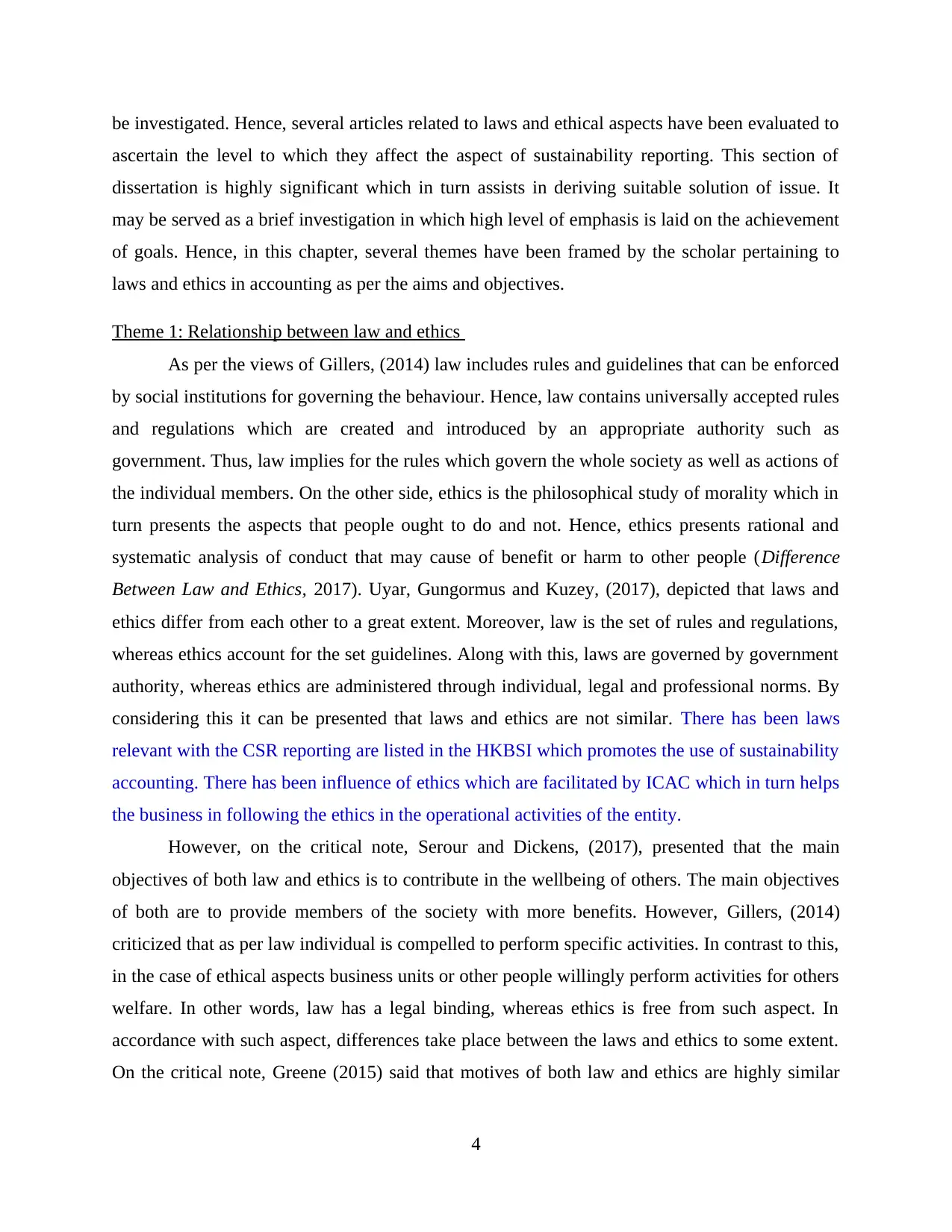
be investigated. Hence, several articles related to laws and ethical aspects have been evaluated to
ascertain the level to which they affect the aspect of sustainability reporting. This section of
dissertation is highly significant which in turn assists in deriving suitable solution of issue. It
may be served as a brief investigation in which high level of emphasis is laid on the achievement
of goals. Hence, in this chapter, several themes have been framed by the scholar pertaining to
laws and ethics in accounting as per the aims and objectives.
Theme 1: Relationship between law and ethics
As per the views of Gillers, (2014) law includes rules and guidelines that can be enforced
by social institutions for governing the behaviour. Hence, law contains universally accepted rules
and regulations which are created and introduced by an appropriate authority such as
government. Thus, law implies for the rules which govern the whole society as well as actions of
the individual members. On the other side, ethics is the philosophical study of morality which in
turn presents the aspects that people ought to do and not. Hence, ethics presents rational and
systematic analysis of conduct that may cause of benefit or harm to other people (Difference
Between Law and Ethics, 2017). Uyar, Gungormus and Kuzey, (2017), depicted that laws and
ethics differ from each other to a great extent. Moreover, law is the set of rules and regulations,
whereas ethics account for the set guidelines. Along with this, laws are governed by government
authority, whereas ethics are administered through individual, legal and professional norms. By
considering this it can be presented that laws and ethics are not similar. There has been laws
relevant with the CSR reporting are listed in the HKBSI which promotes the use of sustainability
accounting. There has been influence of ethics which are facilitated by ICAC which in turn helps
the business in following the ethics in the operational activities of the entity.
However, on the critical note, Serour and Dickens, (2017), presented that the main
objectives of both law and ethics is to contribute in the wellbeing of others. The main objectives
of both are to provide members of the society with more benefits. However, Gillers, (2014)
criticized that as per law individual is compelled to perform specific activities. In contrast to this,
in the case of ethical aspects business units or other people willingly perform activities for others
welfare. In other words, law has a legal binding, whereas ethics is free from such aspect. In
accordance with such aspect, differences take place between the laws and ethics to some extent.
On the critical note, Greene (2015) said that motives of both law and ethics are highly similar
4
ascertain the level to which they affect the aspect of sustainability reporting. This section of
dissertation is highly significant which in turn assists in deriving suitable solution of issue. It
may be served as a brief investigation in which high level of emphasis is laid on the achievement
of goals. Hence, in this chapter, several themes have been framed by the scholar pertaining to
laws and ethics in accounting as per the aims and objectives.
Theme 1: Relationship between law and ethics
As per the views of Gillers, (2014) law includes rules and guidelines that can be enforced
by social institutions for governing the behaviour. Hence, law contains universally accepted rules
and regulations which are created and introduced by an appropriate authority such as
government. Thus, law implies for the rules which govern the whole society as well as actions of
the individual members. On the other side, ethics is the philosophical study of morality which in
turn presents the aspects that people ought to do and not. Hence, ethics presents rational and
systematic analysis of conduct that may cause of benefit or harm to other people (Difference
Between Law and Ethics, 2017). Uyar, Gungormus and Kuzey, (2017), depicted that laws and
ethics differ from each other to a great extent. Moreover, law is the set of rules and regulations,
whereas ethics account for the set guidelines. Along with this, laws are governed by government
authority, whereas ethics are administered through individual, legal and professional norms. By
considering this it can be presented that laws and ethics are not similar. There has been laws
relevant with the CSR reporting are listed in the HKBSI which promotes the use of sustainability
accounting. There has been influence of ethics which are facilitated by ICAC which in turn helps
the business in following the ethics in the operational activities of the entity.
However, on the critical note, Serour and Dickens, (2017), presented that the main
objectives of both law and ethics is to contribute in the wellbeing of others. The main objectives
of both are to provide members of the society with more benefits. However, Gillers, (2014)
criticized that as per law individual is compelled to perform specific activities. In contrast to this,
in the case of ethical aspects business units or other people willingly perform activities for others
welfare. In other words, law has a legal binding, whereas ethics is free from such aspect. In
accordance with such aspect, differences take place between the laws and ethics to some extent.
On the critical note, Greene (2015) said that motives of both law and ethics are highly similar
4
Paraphrase This Document
Need a fresh take? Get an instant paraphrase of this document with our AI Paraphraser
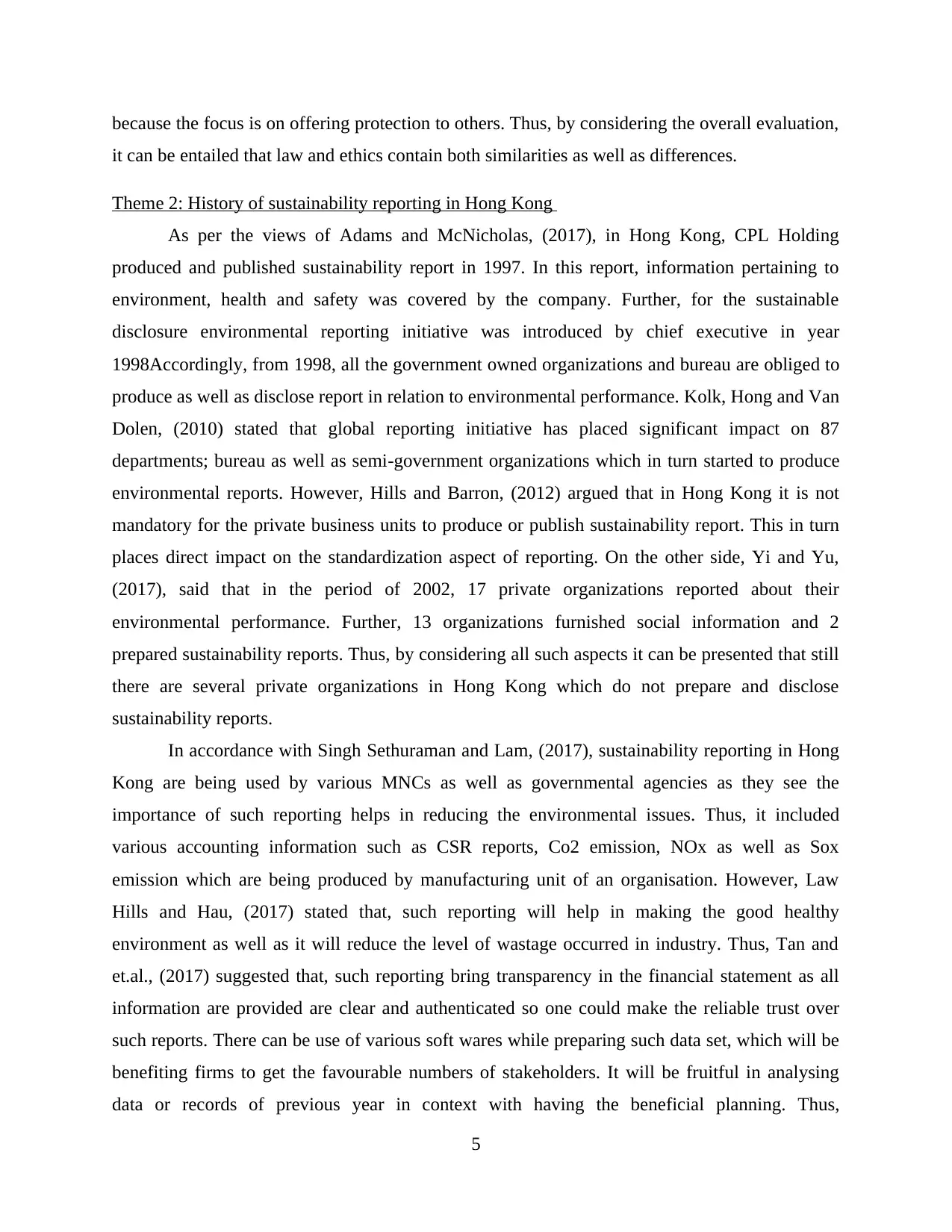
because the focus is on offering protection to others. Thus, by considering the overall evaluation,
it can be entailed that law and ethics contain both similarities as well as differences.
Theme 2: History of sustainability reporting in Hong Kong
As per the views of Adams and McNicholas, (2017), in Hong Kong, CPL Holding
produced and published sustainability report in 1997. In this report, information pertaining to
environment, health and safety was covered by the company. Further, for the sustainable
disclosure environmental reporting initiative was introduced by chief executive in year
1998Accordingly, from 1998, all the government owned organizations and bureau are obliged to
produce as well as disclose report in relation to environmental performance. Kolk, Hong and Van
Dolen, (2010) stated that global reporting initiative has placed significant impact on 87
departments; bureau as well as semi-government organizations which in turn started to produce
environmental reports. However, Hills and Barron, (2012) argued that in Hong Kong it is not
mandatory for the private business units to produce or publish sustainability report. This in turn
places direct impact on the standardization aspect of reporting. On the other side, Yi and Yu,
(2017), said that in the period of 2002, 17 private organizations reported about their
environmental performance. Further, 13 organizations furnished social information and 2
prepared sustainability reports. Thus, by considering all such aspects it can be presented that still
there are several private organizations in Hong Kong which do not prepare and disclose
sustainability reports.
In accordance with Singh Sethuraman and Lam, (2017), sustainability reporting in Hong
Kong are being used by various MNCs as well as governmental agencies as they see the
importance of such reporting helps in reducing the environmental issues. Thus, it included
various accounting information such as CSR reports, Co2 emission, NOx as well as Sox
emission which are being produced by manufacturing unit of an organisation. However, Law
Hills and Hau, (2017) stated that, such reporting will help in making the good healthy
environment as well as it will reduce the level of wastage occurred in industry. Thus, Tan and
et.al., (2017) suggested that, such reporting bring transparency in the financial statement as all
information are provided are clear and authenticated so one could make the reliable trust over
such reports. There can be use of various soft wares while preparing such data set, which will be
benefiting firms to get the favourable numbers of stakeholders. It will be fruitful in analysing
data or records of previous year in context with having the beneficial planning. Thus,
5
it can be entailed that law and ethics contain both similarities as well as differences.
Theme 2: History of sustainability reporting in Hong Kong
As per the views of Adams and McNicholas, (2017), in Hong Kong, CPL Holding
produced and published sustainability report in 1997. In this report, information pertaining to
environment, health and safety was covered by the company. Further, for the sustainable
disclosure environmental reporting initiative was introduced by chief executive in year
1998Accordingly, from 1998, all the government owned organizations and bureau are obliged to
produce as well as disclose report in relation to environmental performance. Kolk, Hong and Van
Dolen, (2010) stated that global reporting initiative has placed significant impact on 87
departments; bureau as well as semi-government organizations which in turn started to produce
environmental reports. However, Hills and Barron, (2012) argued that in Hong Kong it is not
mandatory for the private business units to produce or publish sustainability report. This in turn
places direct impact on the standardization aspect of reporting. On the other side, Yi and Yu,
(2017), said that in the period of 2002, 17 private organizations reported about their
environmental performance. Further, 13 organizations furnished social information and 2
prepared sustainability reports. Thus, by considering all such aspects it can be presented that still
there are several private organizations in Hong Kong which do not prepare and disclose
sustainability reports.
In accordance with Singh Sethuraman and Lam, (2017), sustainability reporting in Hong
Kong are being used by various MNCs as well as governmental agencies as they see the
importance of such reporting helps in reducing the environmental issues. Thus, it included
various accounting information such as CSR reports, Co2 emission, NOx as well as Sox
emission which are being produced by manufacturing unit of an organisation. However, Law
Hills and Hau, (2017) stated that, such reporting will help in making the good healthy
environment as well as it will reduce the level of wastage occurred in industry. Thus, Tan and
et.al., (2017) suggested that, such reporting bring transparency in the financial statement as all
information are provided are clear and authenticated so one could make the reliable trust over
such reports. There can be use of various soft wares while preparing such data set, which will be
benefiting firms to get the favourable numbers of stakeholders. It will be fruitful in analysing
data or records of previous year in context with having the beneficial planning. Thus,
5
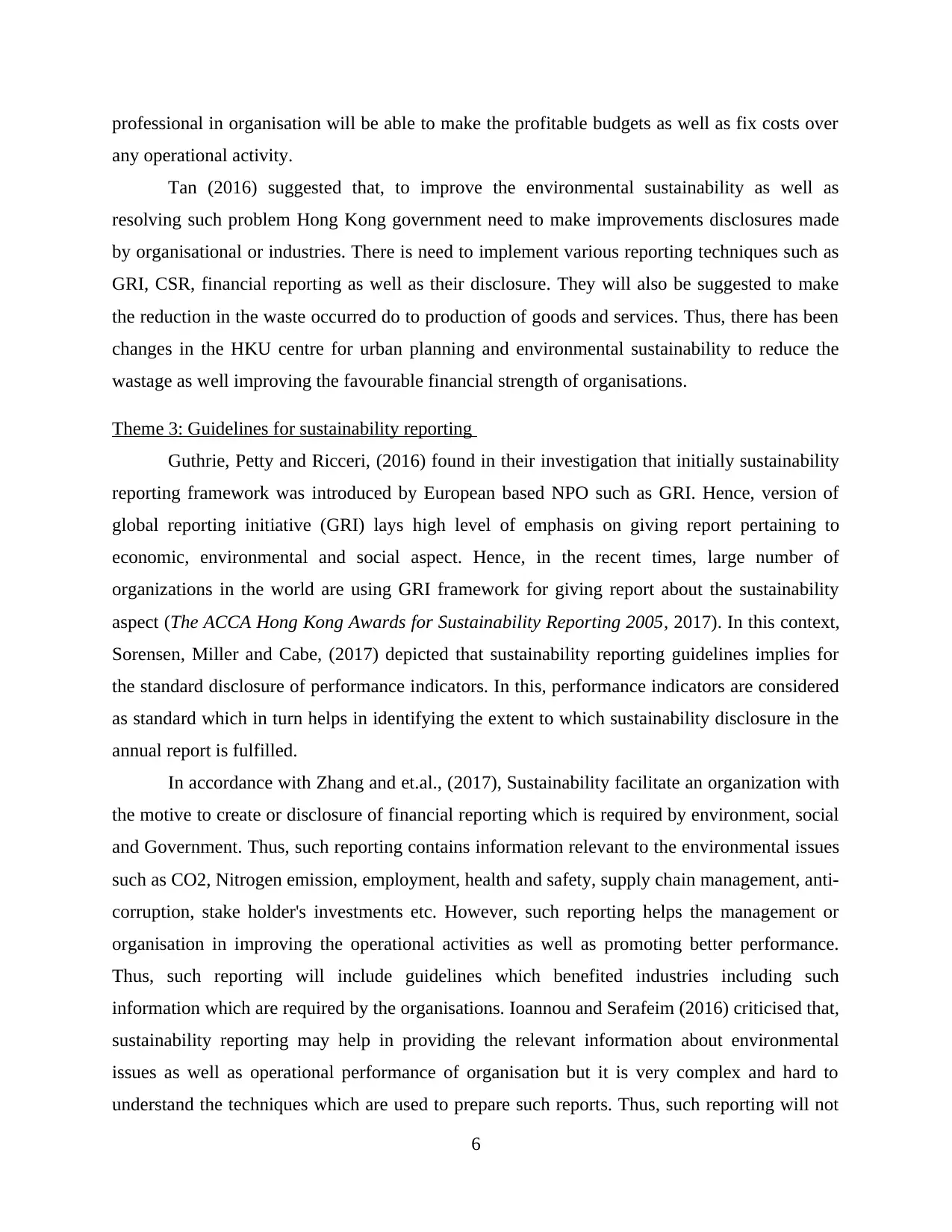
professional in organisation will be able to make the profitable budgets as well as fix costs over
any operational activity.
Tan (2016) suggested that, to improve the environmental sustainability as well as
resolving such problem Hong Kong government need to make improvements disclosures made
by organisational or industries. There is need to implement various reporting techniques such as
GRI, CSR, financial reporting as well as their disclosure. They will also be suggested to make
the reduction in the waste occurred do to production of goods and services. Thus, there has been
changes in the HKU centre for urban planning and environmental sustainability to reduce the
wastage as well improving the favourable financial strength of organisations.
Theme 3: Guidelines for sustainability reporting
Guthrie, Petty and Ricceri, (2016) found in their investigation that initially sustainability
reporting framework was introduced by European based NPO such as GRI. Hence, version of
global reporting initiative (GRI) lays high level of emphasis on giving report pertaining to
economic, environmental and social aspect. Hence, in the recent times, large number of
organizations in the world are using GRI framework for giving report about the sustainability
aspect (The ACCA Hong Kong Awards for Sustainability Reporting 2005, 2017). In this context,
Sorensen, Miller and Cabe, (2017) depicted that sustainability reporting guidelines implies for
the standard disclosure of performance indicators. In this, performance indicators are considered
as standard which in turn helps in identifying the extent to which sustainability disclosure in the
annual report is fulfilled.
In accordance with Zhang and et.al., (2017), Sustainability facilitate an organization with
the motive to create or disclosure of financial reporting which is required by environment, social
and Government. Thus, such reporting contains information relevant to the environmental issues
such as CO2, Nitrogen emission, employment, health and safety, supply chain management, anti-
corruption, stake holder's investments etc. However, such reporting helps the management or
organisation in improving the operational activities as well as promoting better performance.
Thus, such reporting will include guidelines which benefited industries including such
information which are required by the organisations. Ioannou and Serafeim (2016) criticised that,
sustainability reporting may help in providing the relevant information about environmental
issues as well as operational performance of organisation but it is very complex and hard to
understand the techniques which are used to prepare such reports. Thus, such reporting will not
6
any operational activity.
Tan (2016) suggested that, to improve the environmental sustainability as well as
resolving such problem Hong Kong government need to make improvements disclosures made
by organisational or industries. There is need to implement various reporting techniques such as
GRI, CSR, financial reporting as well as their disclosure. They will also be suggested to make
the reduction in the waste occurred do to production of goods and services. Thus, there has been
changes in the HKU centre for urban planning and environmental sustainability to reduce the
wastage as well improving the favourable financial strength of organisations.
Theme 3: Guidelines for sustainability reporting
Guthrie, Petty and Ricceri, (2016) found in their investigation that initially sustainability
reporting framework was introduced by European based NPO such as GRI. Hence, version of
global reporting initiative (GRI) lays high level of emphasis on giving report pertaining to
economic, environmental and social aspect. Hence, in the recent times, large number of
organizations in the world are using GRI framework for giving report about the sustainability
aspect (The ACCA Hong Kong Awards for Sustainability Reporting 2005, 2017). In this context,
Sorensen, Miller and Cabe, (2017) depicted that sustainability reporting guidelines implies for
the standard disclosure of performance indicators. In this, performance indicators are considered
as standard which in turn helps in identifying the extent to which sustainability disclosure in the
annual report is fulfilled.
In accordance with Zhang and et.al., (2017), Sustainability facilitate an organization with
the motive to create or disclosure of financial reporting which is required by environment, social
and Government. Thus, such reporting contains information relevant to the environmental issues
such as CO2, Nitrogen emission, employment, health and safety, supply chain management, anti-
corruption, stake holder's investments etc. However, such reporting helps the management or
organisation in improving the operational activities as well as promoting better performance.
Thus, such reporting will include guidelines which benefited industries including such
information which are required by the organisations. Ioannou and Serafeim (2016) criticised that,
sustainability reporting may help in providing the relevant information about environmental
issues as well as operational performance of organisation but it is very complex and hard to
understand the techniques which are used to prepare such reports. Thus, such reporting will not
6
⊘ This is a preview!⊘
Do you want full access?
Subscribe today to unlock all pages.

Trusted by 1+ million students worldwide
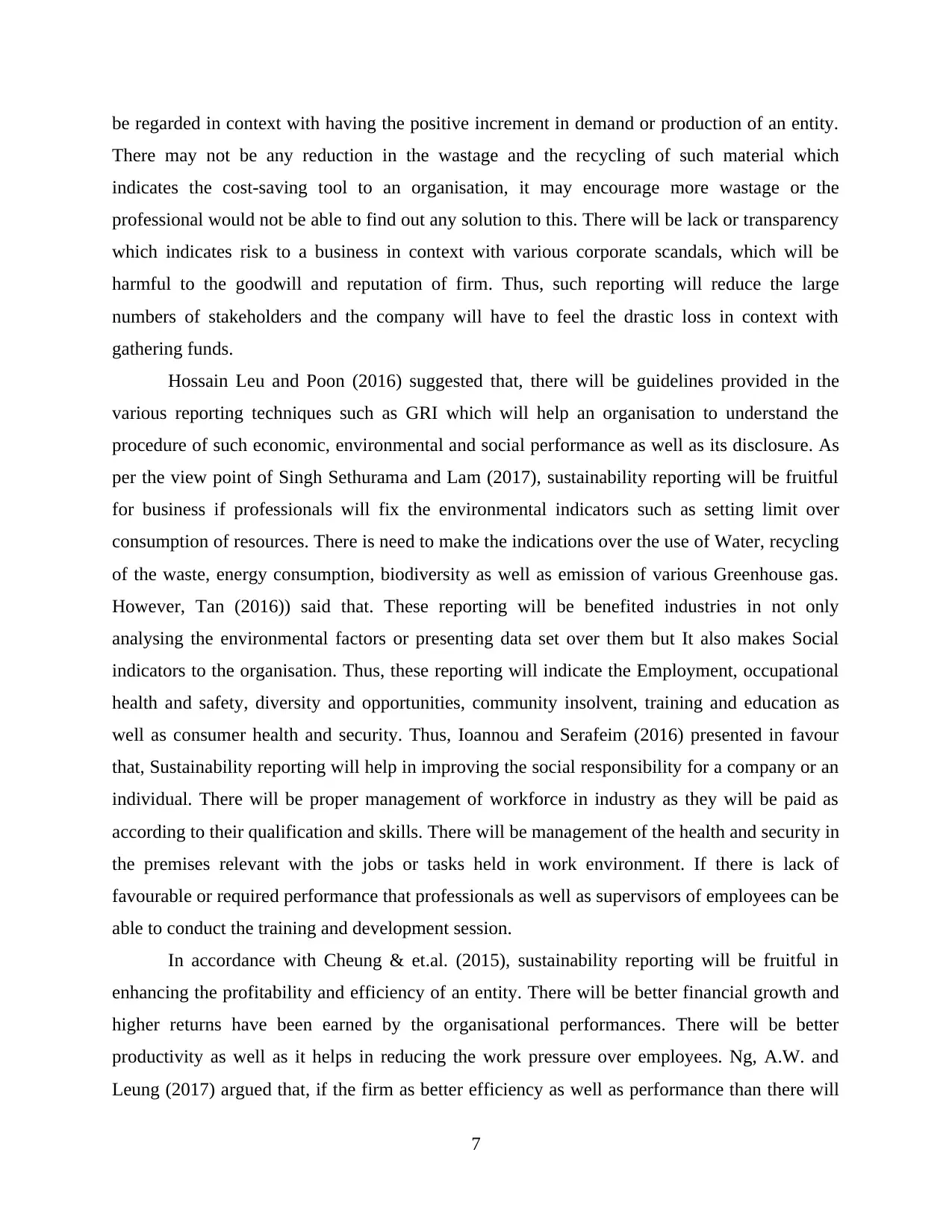
be regarded in context with having the positive increment in demand or production of an entity.
There may not be any reduction in the wastage and the recycling of such material which
indicates the cost-saving tool to an organisation, it may encourage more wastage or the
professional would not be able to find out any solution to this. There will be lack or transparency
which indicates risk to a business in context with various corporate scandals, which will be
harmful to the goodwill and reputation of firm. Thus, such reporting will reduce the large
numbers of stakeholders and the company will have to feel the drastic loss in context with
gathering funds.
Hossain Leu and Poon (2016) suggested that, there will be guidelines provided in the
various reporting techniques such as GRI which will help an organisation to understand the
procedure of such economic, environmental and social performance as well as its disclosure. As
per the view point of Singh Sethurama and Lam (2017), sustainability reporting will be fruitful
for business if professionals will fix the environmental indicators such as setting limit over
consumption of resources. There is need to make the indications over the use of Water, recycling
of the waste, energy consumption, biodiversity as well as emission of various Greenhouse gas.
However, Tan (2016)) said that. These reporting will be benefited industries in not only
analysing the environmental factors or presenting data set over them but It also makes Social
indicators to the organisation. Thus, these reporting will indicate the Employment, occupational
health and safety, diversity and opportunities, community insolvent, training and education as
well as consumer health and security. Thus, Ioannou and Serafeim (2016) presented in favour
that, Sustainability reporting will help in improving the social responsibility for a company or an
individual. There will be proper management of workforce in industry as they will be paid as
according to their qualification and skills. There will be management of the health and security in
the premises relevant with the jobs or tasks held in work environment. If there is lack of
favourable or required performance that professionals as well as supervisors of employees can be
able to conduct the training and development session.
In accordance with Cheung & et.al. (2015), sustainability reporting will be fruitful in
enhancing the profitability and efficiency of an entity. There will be better financial growth and
higher returns have been earned by the organisational performances. There will be better
productivity as well as it helps in reducing the work pressure over employees. Ng, A.W. and
Leung (2017) argued that, if the firm as better efficiency as well as performance than there will
7
There may not be any reduction in the wastage and the recycling of such material which
indicates the cost-saving tool to an organisation, it may encourage more wastage or the
professional would not be able to find out any solution to this. There will be lack or transparency
which indicates risk to a business in context with various corporate scandals, which will be
harmful to the goodwill and reputation of firm. Thus, such reporting will reduce the large
numbers of stakeholders and the company will have to feel the drastic loss in context with
gathering funds.
Hossain Leu and Poon (2016) suggested that, there will be guidelines provided in the
various reporting techniques such as GRI which will help an organisation to understand the
procedure of such economic, environmental and social performance as well as its disclosure. As
per the view point of Singh Sethurama and Lam (2017), sustainability reporting will be fruitful
for business if professionals will fix the environmental indicators such as setting limit over
consumption of resources. There is need to make the indications over the use of Water, recycling
of the waste, energy consumption, biodiversity as well as emission of various Greenhouse gas.
However, Tan (2016)) said that. These reporting will be benefited industries in not only
analysing the environmental factors or presenting data set over them but It also makes Social
indicators to the organisation. Thus, these reporting will indicate the Employment, occupational
health and safety, diversity and opportunities, community insolvent, training and education as
well as consumer health and security. Thus, Ioannou and Serafeim (2016) presented in favour
that, Sustainability reporting will help in improving the social responsibility for a company or an
individual. There will be proper management of workforce in industry as they will be paid as
according to their qualification and skills. There will be management of the health and security in
the premises relevant with the jobs or tasks held in work environment. If there is lack of
favourable or required performance that professionals as well as supervisors of employees can be
able to conduct the training and development session.
In accordance with Cheung & et.al. (2015), sustainability reporting will be fruitful in
enhancing the profitability and efficiency of an entity. There will be better financial growth and
higher returns have been earned by the organisational performances. There will be better
productivity as well as it helps in reducing the work pressure over employees. Ng, A.W. and
Leung (2017) argued that, if the firm as better efficiency as well as performance than there will
7
Paraphrase This Document
Need a fresh take? Get an instant paraphrase of this document with our AI Paraphraser
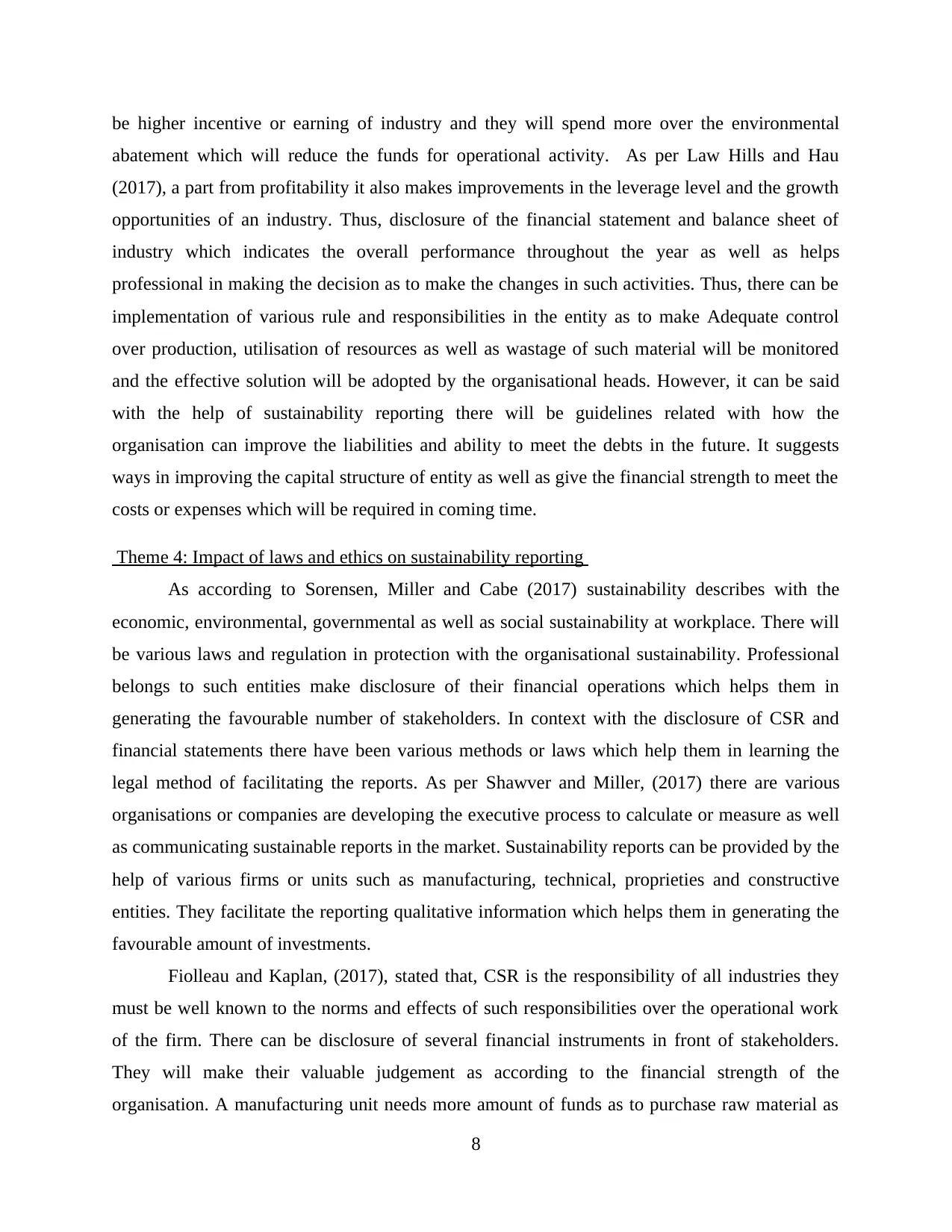
be higher incentive or earning of industry and they will spend more over the environmental
abatement which will reduce the funds for operational activity. As per Law Hills and Hau
(2017), a part from profitability it also makes improvements in the leverage level and the growth
opportunities of an industry. Thus, disclosure of the financial statement and balance sheet of
industry which indicates the overall performance throughout the year as well as helps
professional in making the decision as to make the changes in such activities. Thus, there can be
implementation of various rule and responsibilities in the entity as to make Adequate control
over production, utilisation of resources as well as wastage of such material will be monitored
and the effective solution will be adopted by the organisational heads. However, it can be said
with the help of sustainability reporting there will be guidelines related with how the
organisation can improve the liabilities and ability to meet the debts in the future. It suggests
ways in improving the capital structure of entity as well as give the financial strength to meet the
costs or expenses which will be required in coming time.
Theme 4: Impact of laws and ethics on sustainability reporting
As according to Sorensen, Miller and Cabe (2017) sustainability describes with the
economic, environmental, governmental as well as social sustainability at workplace. There will
be various laws and regulation in protection with the organisational sustainability. Professional
belongs to such entities make disclosure of their financial operations which helps them in
generating the favourable number of stakeholders. In context with the disclosure of CSR and
financial statements there have been various methods or laws which help them in learning the
legal method of facilitating the reports. As per Shawver and Miller, (2017) there are various
organisations or companies are developing the executive process to calculate or measure as well
as communicating sustainable reports in the market. Sustainability reports can be provided by the
help of various firms or units such as manufacturing, technical, proprieties and constructive
entities. They facilitate the reporting qualitative information which helps them in generating the
favourable amount of investments.
Fiolleau and Kaplan, (2017), stated that, CSR is the responsibility of all industries they
must be well known to the norms and effects of such responsibilities over the operational work
of the firm. There can be disclosure of several financial instruments in front of stakeholders.
They will make their valuable judgement as according to the financial strength of the
organisation. A manufacturing unit needs more amount of funds as to purchase raw material as
8
abatement which will reduce the funds for operational activity. As per Law Hills and Hau
(2017), a part from profitability it also makes improvements in the leverage level and the growth
opportunities of an industry. Thus, disclosure of the financial statement and balance sheet of
industry which indicates the overall performance throughout the year as well as helps
professional in making the decision as to make the changes in such activities. Thus, there can be
implementation of various rule and responsibilities in the entity as to make Adequate control
over production, utilisation of resources as well as wastage of such material will be monitored
and the effective solution will be adopted by the organisational heads. However, it can be said
with the help of sustainability reporting there will be guidelines related with how the
organisation can improve the liabilities and ability to meet the debts in the future. It suggests
ways in improving the capital structure of entity as well as give the financial strength to meet the
costs or expenses which will be required in coming time.
Theme 4: Impact of laws and ethics on sustainability reporting
As according to Sorensen, Miller and Cabe (2017) sustainability describes with the
economic, environmental, governmental as well as social sustainability at workplace. There will
be various laws and regulation in protection with the organisational sustainability. Professional
belongs to such entities make disclosure of their financial operations which helps them in
generating the favourable number of stakeholders. In context with the disclosure of CSR and
financial statements there have been various methods or laws which help them in learning the
legal method of facilitating the reports. As per Shawver and Miller, (2017) there are various
organisations or companies are developing the executive process to calculate or measure as well
as communicating sustainable reports in the market. Sustainability reports can be provided by the
help of various firms or units such as manufacturing, technical, proprieties and constructive
entities. They facilitate the reporting qualitative information which helps them in generating the
favourable amount of investments.
Fiolleau and Kaplan, (2017), stated that, CSR is the responsibility of all industries they
must be well known to the norms and effects of such responsibilities over the operational work
of the firm. There can be disclosure of several financial instruments in front of stakeholders.
They will make their valuable judgement as according to the financial strength of the
organisation. A manufacturing unit needs more amount of funds as to purchase raw material as
8
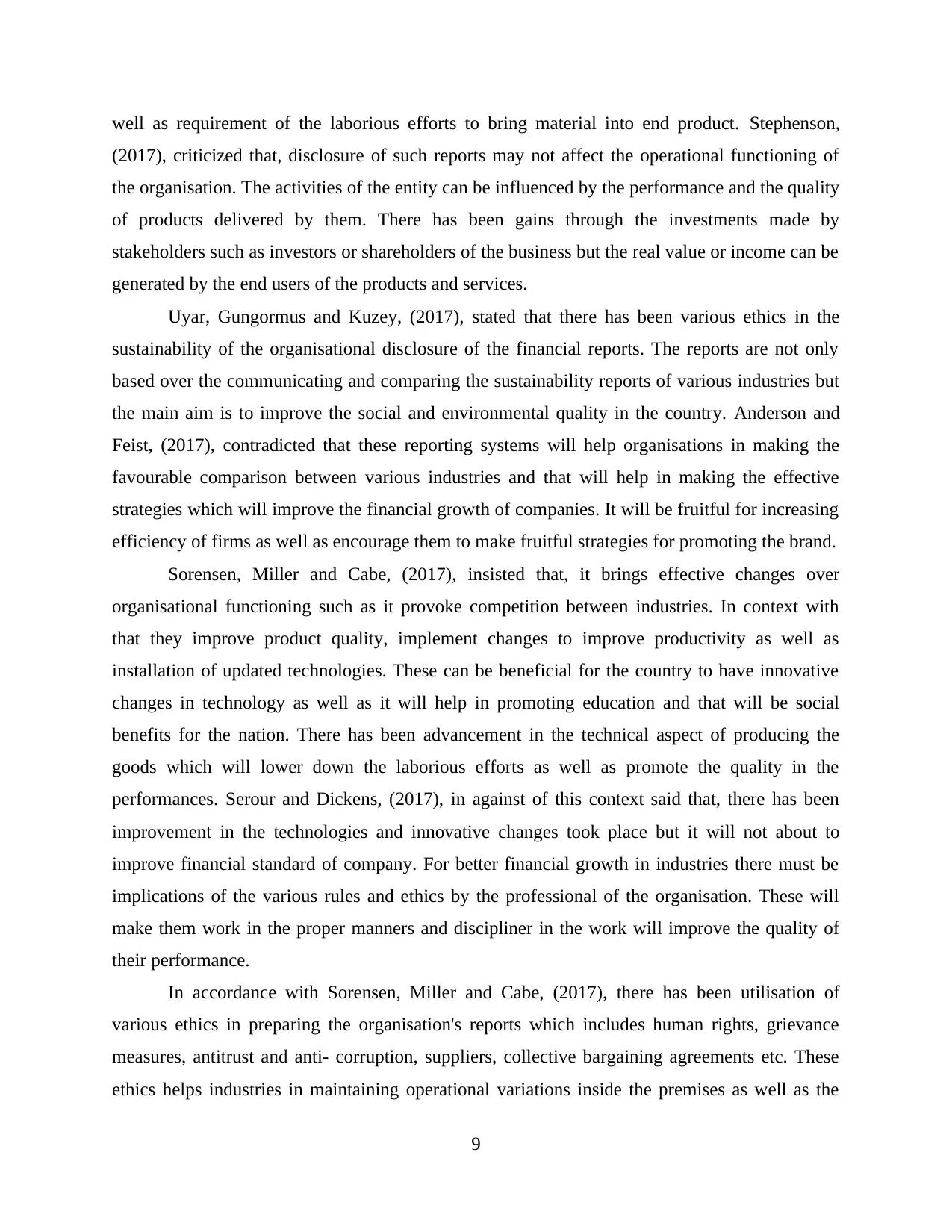
well as requirement of the laborious efforts to bring material into end product. Stephenson,
(2017), criticized that, disclosure of such reports may not affect the operational functioning of
the organisation. The activities of the entity can be influenced by the performance and the quality
of products delivered by them. There has been gains through the investments made by
stakeholders such as investors or shareholders of the business but the real value or income can be
generated by the end users of the products and services.
Uyar, Gungormus and Kuzey, (2017), stated that there has been various ethics in the
sustainability of the organisational disclosure of the financial reports. The reports are not only
based over the communicating and comparing the sustainability reports of various industries but
the main aim is to improve the social and environmental quality in the country. Anderson and
Feist, (2017), contradicted that these reporting systems will help organisations in making the
favourable comparison between various industries and that will help in making the effective
strategies which will improve the financial growth of companies. It will be fruitful for increasing
efficiency of firms as well as encourage them to make fruitful strategies for promoting the brand.
Sorensen, Miller and Cabe, (2017), insisted that, it brings effective changes over
organisational functioning such as it provoke competition between industries. In context with
that they improve product quality, implement changes to improve productivity as well as
installation of updated technologies. These can be beneficial for the country to have innovative
changes in technology as well as it will help in promoting education and that will be social
benefits for the nation. There has been advancement in the technical aspect of producing the
goods which will lower down the laborious efforts as well as promote the quality in the
performances. Serour and Dickens, (2017), in against of this context said that, there has been
improvement in the technologies and innovative changes took place but it will not about to
improve financial standard of company. For better financial growth in industries there must be
implications of the various rules and ethics by the professional of the organisation. These will
make them work in the proper manners and discipliner in the work will improve the quality of
their performance.
In accordance with Sorensen, Miller and Cabe, (2017), there has been utilisation of
various ethics in preparing the organisation's reports which includes human rights, grievance
measures, antitrust and anti- corruption, suppliers, collective bargaining agreements etc. These
ethics helps industries in maintaining operational variations inside the premises as well as the
9
(2017), criticized that, disclosure of such reports may not affect the operational functioning of
the organisation. The activities of the entity can be influenced by the performance and the quality
of products delivered by them. There has been gains through the investments made by
stakeholders such as investors or shareholders of the business but the real value or income can be
generated by the end users of the products and services.
Uyar, Gungormus and Kuzey, (2017), stated that there has been various ethics in the
sustainability of the organisational disclosure of the financial reports. The reports are not only
based over the communicating and comparing the sustainability reports of various industries but
the main aim is to improve the social and environmental quality in the country. Anderson and
Feist, (2017), contradicted that these reporting systems will help organisations in making the
favourable comparison between various industries and that will help in making the effective
strategies which will improve the financial growth of companies. It will be fruitful for increasing
efficiency of firms as well as encourage them to make fruitful strategies for promoting the brand.
Sorensen, Miller and Cabe, (2017), insisted that, it brings effective changes over
organisational functioning such as it provoke competition between industries. In context with
that they improve product quality, implement changes to improve productivity as well as
installation of updated technologies. These can be beneficial for the country to have innovative
changes in technology as well as it will help in promoting education and that will be social
benefits for the nation. There has been advancement in the technical aspect of producing the
goods which will lower down the laborious efforts as well as promote the quality in the
performances. Serour and Dickens, (2017), in against of this context said that, there has been
improvement in the technologies and innovative changes took place but it will not about to
improve financial standard of company. For better financial growth in industries there must be
implications of the various rules and ethics by the professional of the organisation. These will
make them work in the proper manners and discipliner in the work will improve the quality of
their performance.
In accordance with Sorensen, Miller and Cabe, (2017), there has been utilisation of
various ethics in preparing the organisation's reports which includes human rights, grievance
measures, antitrust and anti- corruption, suppliers, collective bargaining agreements etc. These
ethics helps industries in maintaining operational variations inside the premises as well as the
9
⊘ This is a preview!⊘
Do you want full access?
Subscribe today to unlock all pages.

Trusted by 1+ million students worldwide
1 out of 37
Related Documents
Your All-in-One AI-Powered Toolkit for Academic Success.
+13062052269
info@desklib.com
Available 24*7 on WhatsApp / Email
![[object Object]](/_next/static/media/star-bottom.7253800d.svg)
Unlock your academic potential
Copyright © 2020–2026 A2Z Services. All Rights Reserved. Developed and managed by ZUCOL.





